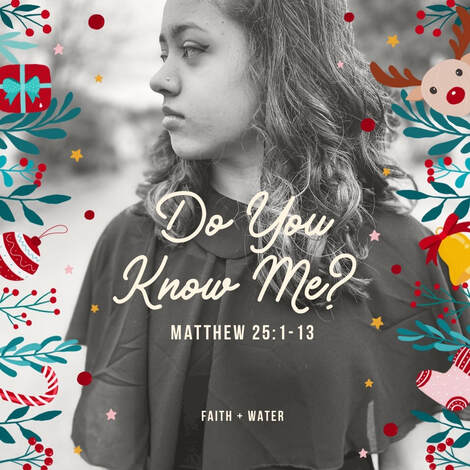 All the secrets of the world are contained in books. Read at your own risk. I’m echoing the sentiments of Lemony Snicket here—what I’m writing is unfortunate and unpleasant. This is our second advent reading—my attempt to bring trend to tradition. I don’t anticipate success. Our scripture reading is from Matthew 25:1-13, where Jesus describes his kingdom as the reunion of a groom and bridesmaids. I'll wait while you look it up. The group obviously know each other, in one sense. After all, the 10 bridesmaids are expecting the groom and the groom is returning to them. And they all look the part. I imagine the ten beautifully arrayed in crimson, violet and sapphire gowns, dazzling with jewels, eyes rimmed in kohl, eyelashes long and dark. Surely, they look exquisite, but I have a horribly limited imagination so who can say? The good news is their appearance has nothing to do with the story—because this isn’t about pretty girls and parties but women (and men too) who live by faith in the Word of God. All ten servants would have said they were there to escort the groom to the feast. But the devil is in the details, isn’t he? Despite stated intentions, similar appearances and shared sleepiness—half of the group wasn’t even close to being prepared for the bridegroom’s arrival. Sure they had the dress and the lamp. Sure they had the good deeds and the church attendance—but they lacked oil. Which means, ultimately, they have a lamp without light which, unfortunately, is a useless kind of lamp. Could the oil represent faith? Or the Spirit of the God? The point is they should've had enough oil to keep the lamp burning until the groom returned—however long it was. Much of evangelism introduces Jesus to the world: Hello Person, meet Jesus. But this is one of those sobering passages that’s more about Jesus knowing us. When the five panicked servants awaken to the groom’s arrival at night with dim lamps and no oil stash, they rush to town to purchase more. (It’s interesting they had money but not oil.) Upon returning to the feast, out of breath, eye make-up smudged, sweaty and hangry—they find the door locked. They bang on the door. They can hear the music! It’s right there. It’s real. They can smell the food, hear the laughter. Open up, open up! The door never opens but a voice moves through it. “I do not know you.” “But we know you! We’re your bridesmaids—we’re just a little late.” “The sad truth,” Lemony Snicket writes in the Hostile Hospital, “is that the truth is sad.” Certainly for the forlorn five the truth—the one they never really believed or ever really lived in light of, was sad. It’s a haunting echo of Matthew 7:21-23, where Jesus explicitly says that not everyone who calls him Lord—believes he is. That many (many!) who do mind-blowing feats for the kingdom were never, ever citizens of it. As we look forward during our advent-ure, let’s reverse the common (and deeply important) question. Instead of asking, “Do you know Jesus?” Ask if he knows you. Finish Well, Dionne
0 Comments
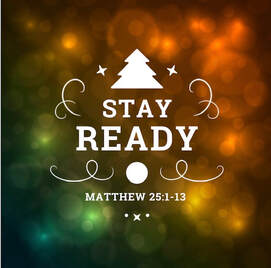 When you stay ready, you ain’t got to get ready. RuPaul said it so did Will Smith. The Bible says it too in different iterations since time immemorial. In Genesis 18:15 Moses promises another servant like him is coming--You must listen to him! Or Isaiah writing of worshiping watchmen who sing and celebrate the return of the Lord--He’s returned and he reigns! (Isaiah 52:7-9) Or Jesus likening his second coming to a returning bridegroom--stay ready so you ain’t got to get ready because if you’re not ready, you’re going to miss everything. Read the passage in Matthew 25:1-13. According to D.A. Carson in the New Bible Commentary, this parable of Jesus deals with the theme of readiness, contrasting the ready with the unready. It’s a torchlight procession at the end of the wedding ceremony, he writes. The groom is escorting his bride home. The “virgins” in some translations or bridesmaids or perhaps even friends of the groom are there to light his path to the feast. They know their role. But something unexpected happens. He delays. They anticipate his return yet don’t know the hour. And he’s taking forever! The ten grow sleepy while waiting and doze off. With Jesus, a promise made is a promise kept. The bridegroom returns and five servants wake up ready while the other five panic. Their ancient lamps likely require oil-soaked rags. The flames burn hot, fast—so extra oil is a necessity. Five bridesmaids are prepared with backup oil flasks—the others didn’t even think about it. “It’s the middle of the night! Who shows up at 3AM? He should have been here 12 hours ago. I don’t have enough oil to last ‘till daylight!” I can imagine one fretful sister saying to her friend. But the thing is, it’s not her role to judge the groom’s itinerary—it’s her job to the hold the lamp. And her lamp just went dark. Waiting isn’t just for Disneyland, doctor’s offices and diagnoses. Waiting is for Christians who need their strength renewed. Before we can walk, run or fly like eagles—we must first wait like watchful bridesmaids. And it’s difficult! Here’s conciliation. We wait expectantly. We wait with a sense of adventure. We vacuum the floors, attend the meetings and read stories to the kids. We fold the clothes and shake the hands and get a good night’s sleep but all the while, we’ve got an eye on the horizon and a go-bag ready on the closet floor. Because the Bridegroom will return. And when He does, we’ll be ready. Finish Well, Dionne 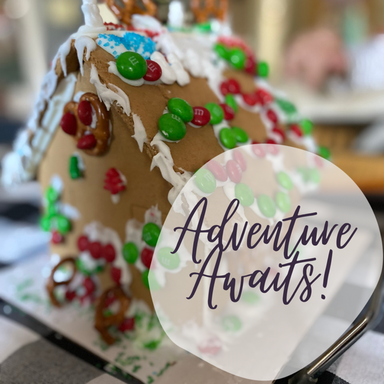 The Latin word is adventus. The Greek word, parousia. It literally means, presence or arrival and biblically, refers to Christ's second coming. For several centuries, particularly in the West, Christians have followed the six seasons of the liturgical calendar. It goes like this: Advent, Christmas, Ordinary time (post-Epiphany), Lent, Easter and Ordinary time (post-Pentecost). If you didn’t grow up observing seasonal religion—you’re in good company because I didn’t either. My parents worshipped with a wide-open Bible. They prayed with, celebrated and served believers and non-believers from all walks of life. Our home faith was a raw, gritty, boots-on-the-ground with eyes-on-Jesus kind-of-thing. I knew the meaning of parousia years ago—not because of a fancy commentary but because my dad SO lives in anticipation of Jesus, it’s his email address! (Every time I hit ‘send’ on an email to my dad, I’m reminded of a theological reality that blows my mind!) As I got older, I started craving religious tradition. The informality, fluidity and flexibility of faith is important but the ramparts matter too. It’s like a holiday dinner. I can cook or even enjoy a catered meal but there’s something about great-grandma’s macaroni and cheese that materializes from her vintage recipe card—something about pulling up to my parent’s home and feeling good. Tradition is connection. Linking arms with brothers and sisters who’ve gone before—building on the foundation they laid, moving from elementary teaching to maturity as the writer of Hebrews says (Hebrews 5:11-6:3). And that brings me to Advent. It’s the four Sundays before Christmas where traditionally, two are dedicated to looking forward to Christ’s second coming and two recall the first. Join me in this advent-ure with four short reflections from Matthew 25:1-13—the parable of the ten bridesmaids. I'll post a new entry each Sunday and we'll discover the mysteries this parable reveals. Finish Well, Dionne 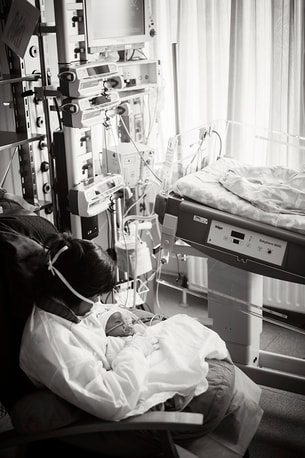 Stock Image Stock Image I struggle with fear. I am often afraid. I don’t have the anxiety that 40 million American adults battle--a chemical imbalance in the brain, a disorder brought about by trauma or an inherited condition—nope, I’m just a scaredy cat. Most of my friends wouldn’t know this about me because I do scary things. I moved out of one country and halfway across the next. I started over when I was 25 years old and again in my early thirties. My husband and I care for the children of people addicted to things and those in recovery. Scariest of all, we have teenagers—one of them even drives. I dread having a life that lacks purpose and legacy. I don’t want to live for vacations and greater luxury. I don’t want to live vicariously through movie-stars or influencers but be influenced by God, the star-maker and experience satisfaction in Him. So greater fear quells the lesser. Fear of life that lacks purpose motivates me to seek purposeful endeavors that often involve risk. But it’s still fear. And since fear isn’t the antidote for fear, every once in a while, I get caught in my own snare. There’s a scene in Matthew’s Gospel where a storm swirls on the Sea of Galilee and it rages with such ferocity that seasoned fisherman fear for their lives. Save us! We are perishing. (Firstly, what a perfect request.) Jesus who had been sleeping peacefully during the storm—speaks peace to the storm: Shalom. Then he speaks faith to his friends, “Why are you afraid, O’ you of little faith?” And from Jesus we learn, faith is an antidote to fear. Not necessarily faith that the storm won’t be fatal or disastrous but that it submits to the voice of God and will do no more or less that He has purposed. It’s not really the storm that has life or death power—but God, and through Jesus He’s our father and friend. That’s good news. Faith in God becomes fertile ground for love of God from which all manner of wonder flows. “Beloved, let us love one another for love is from God and whoever loves has been born of God and knows God. Anyone who doesn’t love doesn’t know God because God is love. In this, the love of God was made manifest among us: God sent his only Son into the world that we might live through him. There is no fear in love because perfect love casts out fear.” (1 John 4:7-9, 18) If it’s true that “perfect love casts out fear” then the opposite is also true, fear casts out love. Fear banishes love. Perhaps, as others have suggested, it isn't hate but fear that is the antithesis of love. One afternoon, quite unexpectedly, I got a call from our foster care agency. We’re going on our 6th year with an active license and though we’ve done a little respite care, we haven’t taken a placement for a long time. This request was worth the wait as it was more intense than ever before. Could we take an infant with an extensive medical history? We’d need to receive training from the hospital, add a lot more driving and extra appointments to the calendar. All this on top of the reality that babies generally require a great deal of care. Our agency was gracious, but they needed an answer as soon as possible—a team of health care professionals and social workers were waiting. I was simply driving from one place to another when this “storm,” this emotional crisis, came upon me. It was a crisis because I knew the reasons we should do it, and the reasons we shouldn’t. We have five other children whose lives and needs stretch the course of the day. Would I be up all night? Could I care for someone so little, so fragile with so many extraneous appointments? I honestly didn’t know. Here’s the faith part. We prayed. And asked close friends pray. I didn’t want anyone’s opinion or a pros and cons list—because I didn’t want anyone influencing me who wasn’t in the Spirit. I wanted to hear from God. Because I knew it would take God to do it well. My husband and I prayed and went to bed. I woke up a little after midnight, twisting and turning this idea in my mind. I couldn’t just say no. I couldn’t just say yes. Jesus’ disciples felt they were perishing in their storm—I was paralyzed by mine. And there’s one thing that paralyzes my mind like that. Fear. In my inner room, sometime before dawn as I was meditating and interrogating myself (medinterrogation—where you think and ask yourself questions!) the Spirit led me to the right question. What would your answer be if you weren’t afraid? If I wasn’t afraid? I was terrified of a glass baby with a litany of unique needs. I was desperately afraid of not meeting the needs of my husband and children and incurring resentment. I was fearful of lost sleep, an interrupted schedule and no quiet time for myself. Fearful of taking on too much and not doing well by anyone. But if I wasn’t afraid? If I was confident that Jesus was in the boat with me, with us? In an instant, faith spoke shalom to the storm in my mind. Yes. We’re in! We can’t wait! Dang. Is fear really that blinding? Paralyzing? If perfect love casts out fear the opposite is also true, fear casts out love. My fear of failure, loss, interruption, uncertainty was inhibiting love. God was calling our family to love another family and fear was standing in the way. I knew the next step. Every foster parent who’s crawled through the trenches has encountered non-foster parents who confidently assert their desire to foster only they are impeded by their profound love which (ironically) prohibits them from fostering. “Oh, I love so big and it would hurt to give them back—so I won’t do it at all.” Maybe they’re paralyzed by fear too? Here’s what I knew to do. I prayed for love. Big, swelling, comprehensive, stay-up-late, get-up-early love. Brave love. I prayed that “other’s love” would surpass self-love in my heart. I needed more love than I currently had access to. New love. Fresh love. I don’t naturally love big, I love selfishly small and to care for this child I knew I needed divine help. Since God is love and God manifested that love by sending Jesus to calm storms (among other things), I prayed for love to foster a baby. I prayed for love. And it came. Like a whisper. Like thunder. That love was power! We received the required medical training. Made every appointment. Our family pulled together and we learned to care for Baby like we were born for the task. We prayed for and befriended the birth family during our time together. And then, as quickly as the storm appeared, it subsided. We got to return this bundle to a hopeful mother and a gentle father. The child we spent hours deliberating over was the child we didn’t want to leave. Isn’t that funny? Baby’s gone now and doing well with family. A few days after the departure I found a tiny sock under a chair—this little one preferred to keep one sock on and kick the other off. In curling cursive, the word "love" decorated the cuff. It made my eyes sting and it made me smile. Faith is an antidote fear but love--the kind of love that God is, well that kind of love devours fear for breakfast. This isn’t to say I’m not still a scaredy cat or that you should stop taking meds if that’s how the Spirit has led you. I don’t even mean to imply that all fears are all bad—the right kind of fear saves (Proverbs 1:7). I just want to encourage you to be aware. Fear can dampen faith and quell love. Don't let it. Fear is impatient and harsh. Love is patient and kind. Insecurity is envious and boastful. Love prefers humility. Selfishness is irritable and resentful. Love is neither. Jealousy rejoices at other’s failures. Love rejoices with the truth. Love bears all things, believes all things, hopes all things, endures all things. And of the triple-ingredient antidote: faith, hope and love, the greatest is love. (1 Corinthians 13:4-13) Love is the greatest. Finish Well, Dionne They deny God and set cities aflame (Psalm 14:1, Proverbs 29:8). They’re sowers of discord and fear. They move in arrogance and prayerlessness. They wield words without reading the Word and speak like kings though they’re submitted to none.
Their end is certain. They will receive condemnation (Proverbs 19:29) and be “astounded and perish,” (Acts 13:41). Who are the scorners of Proverbs, the fools of Psalms? Who sits in this abominable assembly content to live unblessed by God? (Psalm 1:1). Murderers? Liars? Thieves? The answer is less dramatic to our unholy ears: Scoffers. Experts in throwing shade or discrediting with a laugh and smile. Clever and smart—a mocking retort on the tongue’s tip. Bitterness rolled in sarcasm. An elegant eyeroll. A pedigree of pride that spreads its rot like mold in a damp basement. A sin so putrid to God yet so common among his people. The Apostle John tells us Jesus is life which is the light of men. He’s the invincible light that overcomes the darkest darkness and moldy basements. The Baptizer John tells us that making space for God’s light begins with repentance. Repentance. The act that transforms the scoffer in the mirror to a mourner who is comforted, that empties the spirit of pride, revealing its poverty while preparing it for heaven. Let God’s people with our varied ethnic expressions and lived experiences, our staggered social status and spectrum of comprehension, our measure of giftings and spiritual maturity, remember foremost, we are God’s people. We’re the lost lamb that was sought. The rebellious prodigal who was restored. The bleeding woman who was healed. The wailing leper made clean. Seasoned with salt, our words preserve truth and add flavor to bitter life. Our arrogant self-boasting is crushed, washed, recycled into Christ-boasting. Critical speck-finding becomes a plea for eyelog extraction. And the reward is great. It is living blessed. It is being known by God. It is like sheltering inside a house built upon rock, hearing the storm scream and slam against the exterior while knowing collapse is impossible. Impossible. We can disagree but we can’t say, “I have no need of you.” We aren’t to scoff at one another or ridicule a weaker member of the family because they are, in the Apostle Paul’s words, “indispensable” (1 Corinthians 12:22). And when we contrast scoffer’s synonyms--belittler, detractor, persecutor, tormentor with its antonyms--comforter, praiser, soother, champion—the point becomes crystal clear. The One who could justifiably scoff, didn’t, but emptied himself becoming a servant, humbling himself unto death, even death on a cross so that the mouths of mockers would be filled with praise. Blessed is the man who walks not in the council of the wicked, nor stands in the way of sinners, nor sits in the seat of scoffers; but his delight is in the law of the LORD and on his law he mediates day and night. Psalm 1:1-2 Finish well, Dionne 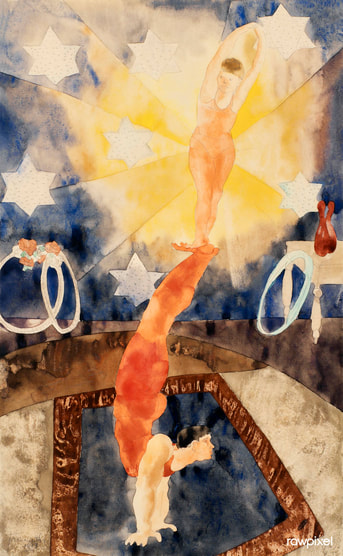 Take care of yourself first—then you can take better care of others. I heard this for the zillionth time but for the first time, I wondered if it was true. I have a circus and a farm—many children, lots of animals. Because we like animals and foster children, we keep the door open. I have a lot of creation to tend to—how can I tend well? How do I love and serve and teach and protect without dissolving into a puddle by day’s end? The answer I’m told is self-care. Psychology Today extols the virtue of “me-time,” something we shouldn’t feel guilty for. “Learning how to eat right, reduce stress, exercise regularly and take a time-out when you need it are touchstones of self-care and can help you stay happy, healthy and resilient.” (Self-Care: 12 Ways to Take Better Care of Yourself, December 28, 2018.) I get that. If I’m incapacitated or dead because I haven’t taken time to eat with wisdom, sleep with peace and manage anxiety—which is just a fancy word for fear—then I’m of little use to my circus-farm. I’m not sure this is self-care in my books though—seems more like common-sense survival skills. And maybe that’s why I’m pondering this modern gospel because it’s often ambiguous and self-defined. We all agree that sleep, nutrition and stress management are essential. I have worked in the weight loss and nutrition industry for more than a decade—I believe this. But is that what the self-care gospel is really about? Is it simply reminding me to eat my veggies and go to bed early—or is it something else? In 2019, prior to COVID, Americans spent 1.1 trillion dollars on travel. Trillion. (In full disclosure, a few of those dollars were mine.) The average American spends a little more than $3000 per year on restaurant food. A study conducted by OnePoll for Groupon said women spend more than $225,360 over a lifetime on hair and skincare. As one writer for Byrdie put it, “we probably couldn't have guessed that on average, the amount of money we spend on our appearance could pay for four years of college tuition.” And into this congregation of well-fed, professionally maintained, well-travelled parishioners, culture preaches: You first. You are useless to others unless you keep thinking of yourself. Wait…does that even make sense? I can look into the eyes of a Starbucks employee and order a menu-noun with eight adjectives—and be taken seriously. Or I can have faster food on wheels delivered to my doorstep courtesy of Uber Eats. I can book a trip around the world from my phone or order anything I want on Amazon and then—to make my joy complete, post a picture of me and it on social media and bask in the warmth of approval with a cascade of “likes” and the hashtag #selfcare. Is this really the way? If it is, why aren’t we satisfied yet? Why are there so many people suffering when so many of us (talking to the mirror, here) have focused expertly on self. Shouldn’t I have enough “oxygen” by now so that I can metaphorically put the mask on my suffocating neighbor? Creation has a creator. So I go to the Word, the Bible for help. Is there a verse where Jesus—or anyone really, teaches me to do this? A Self-Care Sermon on the Mount? A Psalm of Self? A pro-me proverb? -Jesus, what’s the most important thing for me to do? Dionne, love the Lord your God, love me, with all your heart and with all your soul and with all your mind. And when your heart, soul and mind are saturated with the limitless, eternal, cleansing, healing love of Me let it overflow to your neighbor and love them the way you want to be loved. This is the greatest command (Matthew 22:36-40). -But Lord if I give myself away so completely—what will be left? They said I’ve got to put my oxygen mask on first before I help someone else. Me first—then them. Dionne—the lives of the travelers in the plane are not dependent on plastic masks but on the competency of the pilot and I have a way with storms. If a tube connected to recycled oxygen is helpful imagine what’s possible when God himself breathes the breath of life into you. If you put yourself first, you will run empty before long (you know this; you do this!) but there’s another way. Me. Trust in me and I will supply all your needs according to my glorious wealth (Philippians 4:19). Look at the birds. They’re terrible at self-care. They don’t plant or harvest or store food in barns and yet your heavenly father feeds them. You are so much more valuable than them! You don’t have to take care of yourself first because I’ll take care of you best (Matthew 6:26). It’s not you first—but Me first. Seek my kingdom first, my righteousness first and I will share my power so that you will bless and be blessed. Because it’s not two steps but one. I will fill you as you fill others. I will serve you as your serve others. I am the vine. You are the branch. Abide in me and YOU WILL PRODUCE (John 15:5). It’s not self-care but trusting God’s care that leads to caring for others well. There’s more. Those commonsense survival skills—eating veggies and going to bed early, can be elevated from something small like “me-time” to glorious acts of worship—in fact, they’re supposed to be (1 Corinthians 10:31). I don’t always get this right. Sometimes I’m still a puddle by day’s end. Sometimes I’ve poured it all out and still feel empty. Sometimes I feel that if I don’t hoard or gather or store-up resources for myself, no one else will or worse, I’ll have to take what God provides. And his “gifts” can be bitter at times. They can cut. They can pierce the self I’m trying hard to protect. They can crucify. Just days before his flesh would tear, his mouth would run dry and his heart break with grief, Jesus, whose life was marked by others-care more than self-care, preached to his friends. “It’s time for me to be glorified. Watch and learn. I won’t sit on a gilded throne and require the life of my citizens. As the King of kings I will give my life on a rugged cross for my citizens. This is the truth: Unless a grain of wheat falls into the earth and dies, it remains alone—but if it dies, if that seed breaks open, it bears much fruit! Whoever lives for self, lives as a renter—paying rent for a lifetime and owning nothing in the end. Whoever lives for me owns spiritual property and will receive a deed to eternity” (John 12:23-26). This is the Jesus-gospel. Repent of the self-life with its shelf-life in exchange for eternal life who is Christ. (Read that again.) Maybe Jesus would say to me—to us, what we call “self-care” is an off-brand knock-off that isn’t beneficial to anyone long term. Maybe he would say, it’s a lie that doesn’t deliver what it promises. He would say, we are made for more because we are made for him. So I tip my Ringmaster’s hat to another day, slide tired feet into farmer’s boots and step forward, cautiously, joyfully. I know Jesus will take better care of me than I could ever take of myself. I’m linked to truth through faith. I crush that piddly, plastic oxygen mask underfoot. I don’t need an emergency dose of canned air, I need the moment-by-moment inhalation of the eternal God who knows my needs before I ask. And so do you. Finish Well, Dionne 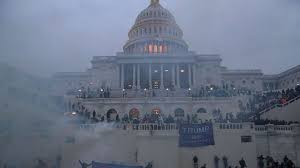 US Capitol breached, courtesy of ABC News US Capitol breached, courtesy of ABC News Defilement is a horrible thing to experience. I remember once, when I was fifteen, thieves broke into our home. I awoke early to find a severed phone cord, scattered belongings and wide-open back door. They robbed several other homes on our street and when they were apprehended days later, we learned it was a team of three men. Three men breaking, entering, searching, taking…steps from my closed but unlocked bedroom door. I was the only one who slept in a basement bedroom—my parents and three siblings safely upstairs. I could have been destroyed that night but was protected. Unseen sentinels stood at my door refusing to let them pass. Watching the Capitol siege was a bit like that, after I realized I wasn’t seeing doctored images—because it was that unbelievable. A pundit made the connection for me. “It was like watching a sacred space be defiled,” he said. There are other issues too. Race. DC would be aflame if the rioters were Black. We know this is true. Distraction. So much of our time is time is spent thinking, talking and writing about these things. Our sense of peace compromised by the activity there and the trickle-down effect here. When I look on my screen—television, computer, phone—it’s a cacophony of chaos. When I look out my window screen, observe real life, it’s really lovely. That disconnect is disturbing. But the real issue seems to be powerlust. A man who isn’t a servant-leader but a would-be despot who’d flip the country upside down, turn it inside out, suck his mob dry of worship—and still be hungry. Is he just a flash of lightening that once captured by the rod, dispersed and grounded, goes away? Or is he representative of something else—a collective ideal (now heavily tarnished) that once sparkled like diamonds. We do love sparkly things, don’t we? Our country (my adopted, beloved country) created the systems that put this man, this type of man, in charge. His wealth and power were worshipped long before he was elected. I remember the opening of The Apprentice, where he walked in slow motion with Anthony Jackson’s killer bassline from For the Love of Money searing every step. He’s not revered like that anymore and the legacy of his presidency is going up in smoke—but the animosity surrounding him is spreading like contagion. When I see people respond to his cruelty with their cruelty—storming buildings, intimidating, taking over AND unfriending, belittling, name-calling, calling-out, I fear we’ve got it backward. Add fire to fire and you get an inferno. It’s so easy for people to wound other people over politics and so difficult to show mercy, grace and compassion. Politics exist to serve people—not the other way around. Does this mean we eschew accountability or stifle individuality? Certainly not. But it does mean we don’t fight with the same weapons. Rage and outrage are still rage. There’s a Psalm I love. David is recounting a time when the ‘cords of death’ encompassed him and ‘torrents of destruction’ assailed him—a time when the sacred was defiled. He called out to God and was delivered—restored. But not the way you may expect. “You have given me the shield of your salvation and your right hand supported me and your gentleness made me great.” Psalm 18:35 Greatness, by way of God’s gentleness to us. Lord, make America gentle, for the first time. To extinguish the fire we need water from above. Rain from heaven that quells the flames and brings life to desolate ground. We need repentance, forgiveness and the rejection of hatred that casts ourselves and the like-minded as heroes and others as unworthy. We need to learn to love our enemies. Hating is too easy. And anything that easy should be suspect. I will be joining with countless others in praying for restoration for our country, wisdom, protection, peace and a good use of power for our new president and vice president, for a strengthening of our democracy and for the families who are suffering. There are so many. We’ve experienced a season of defilement now I pray we experience grace that leads to healing and the restoration of sacred places. Finish Well, Dionne  Beloved, I want the best for you and I am what's best for you. I am rich but for your sake, became poor. I mourned and was comforted. I’m gentle and meek and the earth is mine. I hunger and thirst for righteousness and am satisfied. I am merciful and extend mercy to you. My heart is pure and I enjoy deep fellowship with our Father. I am a peacemaker—my message is the Gospel of Peace. Blessed and happy are you when you do as I do! It’ll hurt at times. You will be misunderstood, reviled, even threatened—but don’t be intimidated. This is evidence of our connection. You will see my faithfulness. You are salt so preserve truth and make the world more palatable for everyone you encounter. You are light and cannot be hidden. So shine! I have done more than uphold the law—I’ve fulfilled it. Join me in this adventure. You remember they said, “don’t murder?” In my kingdom, we don’t even think hateful thoughts. Seek reconciliation. Befriend your enemy. Bring peace to a world set on war. You remember they said, “don’t be unfaithful?” In my kingdom, we would sooner be blind or disabled than use our bodies to take from another. We’re a devoted, incorruptible, unwavering lot. Honor marriage—yours and others. Honor integrity. Give freely to the one who asks. Make peace with your enemies. The ones in your family, at school, at work, online. How? Pray for them—even when they hurt you. Call out to Our Father, who is holy. His kingdom is here. Pray His will would be revered on earth the same way it's revered in heaven. Ask Him to meet your needs and forgive you when you fall short. Forgive others. Pray for rescue. Give me your heart and I will hold your treasure. This is my way. And you are mine. God is good to all, allowing His sun to rise on just and unjust people—so imitate your Father. Shine. If you show compassion to those who reciprocate—is that even love? Nearly anyone can do that. A characteristic of my people is they show mercy, forgiveness and sacrificial love to all--especially their enemies. Pursue humility. Let your Father in heaven reward you for living the kingdom lifestyle. Resist the temptation to virtue signal. If you do, “likes” on your Facebook feed will be your only reward—and we’ve got greater things in store for you. Talk to me, a lot—but not in a way that intimidates or impresses those within earshot. Speak to me, like you love me. Remember to fast. It’s a profound way to invite God’s presence into your life but do it joyfully! Can we talk about money? Wealth? Asset management? Beware. Many people, greater than you, have had their eyes and hearts darkened by greed. It’s impossible to serve God and money. So pick me…and while you’re at it, give me your anxiety too. I know you’re afraid and I want you to know, I’m with you. Always. Don’t worry about what you’re making for dinner, what diet you need to try, what jeans are most flattering. Life is so much more than food and drink and clothes. I promise, I know you need these things. But more than another pair of shoes, dinner at your favorite restaurant or even a strong cup of coffee—you need me. You really do. Seek me first by following in my footsteps. Trust my words. Trust my love. I am the way, -Jesus  When writers take pen to paper, they mean to convey something. Word choice, tone, pacing and imagery are like the chisel and rasp in the hands of a sculptor—they remove blocky bits and file until points are smooth. If this is true of human writers, how much more of God who breathed life into both humanity (Genesis 2:7) and scripture (2 Timothy 3:16-17). We know from the anonymous writer of Hebrews that faith is the assurance of things hoped for, the conviction of things not seen (Hebrews 11:1). Assurance. Conviction. One way biblical writers convey this sense of reality, is by choosing words and images that make invisible faith into something tangible—something we experience with God-given senses. Hear Sh’ma Yisra’eil Adonai Eloheinu Adonai echad. Hear, Israel, the Lord is our God, the Lord is One. (Deuteronomy 6:4) The Shema given to Moses by God, is in the mouth of our Lord also, when asked to define the greatest command. How does obedience begin? By hearing. “The most important (command),” answered Jesus, “is this, ‘Hear, O Israel: The Lord our God, the Lord is one. Love the Lord your God with all your heart and with all your soul and with all your mind and with all your strength.’ The second is this: ‘Love your neighbor as yourself.’ (Mark 12:29-31) Or in Hebrews 3:15, where believers are commanded to listen with urgency: Today, if you hear his voice, do not harden your hearts as in the rebellion. Smell Mary therefore took a pound of expensive ointment made from pure nard and anointed the feet of Jesus and wiped his feet with her hair. The house was filled with the fragrance of the perfume. (John 12:3) Inhale the healing scent of spikenard, an amber-colored essential oil found in the hills of India and Nepal. Rare, costly and aromatic it fills not only the nostrils of the guests—or the room--but the whole house. This is Christ’s burial anointing—a prophetic fragrance for humanity. Sight From signs and dreams conveyed by the prophets of old to the restored sight of many during Christ’s lifetime—seeing rightly, has long been a characteristic of faith. With sight we can sin (Matthew 5:28), confront sin in ourselves and others (Matthew 7:3) and live out new lives of faith (John 20:29). Taste The Passover’s unleavened bread, Cana’s good wine and the sacrament of communion: whenever you eat and drink, remember me. Faith has texture and flavor. It simultaneously helps us reminisce and anticipate. It satisfies soul hunger. Oh, taste and see that the Lord is good! Blessed is the man who takes refuge in him! (Psalm 34:8). Touch Read the story of the woman with the issue of blood in Luke 8. Feel her desperation. Isolation. An outcast under Israel’s law, yet with trembling, faith-filled hands, she grasps the Healer’s garment—and experiences immediate restoration. Use your senses to enjoy God as you experience faith. It's why they exist. Finish Well, Dionne  (Originally written in May 2020) For more than two months Americans have been quarantined in their homes, many masked and gloved when not, for fear of a virus that has the power to steal breath. In the early days of the coronavirus pandemic, we were told the virus attacks the lungs—comprising the ability to breathe, particularly in immunocompromised patients. Ventilators, which help the body circulate oxygen, provide a critical last resort. And they were in short supply. A rally cry went up and the production of these bedside breathing machines came from unlikely sources. Engineers from Mercedes developed a machine in less than a week. Tesla and SpaceX also made commitments. The need to breathe is fundamental. Human life is valuable. Then on Monday May 25, a video showing the cruelest of ironies and the evil of systemic racism reverberated like a thunderclap. A police officer rested calmly, his knee on another man’s neck. “I can’t breathe.” Crowds pleaded with law enforcement while recording the incident on cell phones. “I can’t breathe.” The man on the ground, George Floyd, begs for help and calls for his mother, gasping for breath--the very thing our nation has pulled out all stops, to preserve. Racist roots have produced bitter fruit for decades—a scourge on the United States. It’s an assault on humanity and worse, a blatant attempt to undermine and deface the One in whose image both George Floyd and Derek Chauvin were made. God created man in His own image, in the image of God He created him; (Gen 1:27). Then the LORD God formed man of dust from the ground and breathed into his nostrils the breath of life; and man became a living being, (Gen 2:7). We are image-bearers of the living God who’ve received the breath of life—as a gift. We aren’t to imitate Cain who beat his brother dead out of jealousy, hatred and rage but like Jesus, who withstood the shame, indignity and agony of the cross to bring life. There is no room in a Christian’s life to tend pet sins and racism is a common beast. The grace shown us isn’t merely leniency but power to grow beyond immature bigoted beliefs (1 Corinthians 13:11), repent (1 John 1:9) increase in love (2 Thessalonians 1:3) and lay down our lives for one another (John 15:13). If there’s anyone who has the right to drive his knee into neck of sinner as breath hemorrhages—it’s Jesus Christ and he did the opposite. Let’s go and do likewise. |
Dionne"Lay aside every weight and the sin that so easily entangles and run with endurance the race set before you. " Archives
June 2023
Categories |
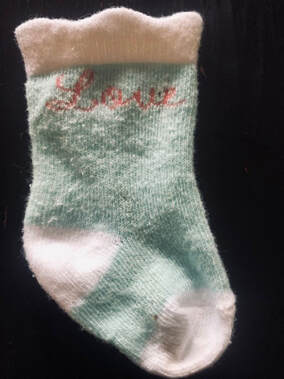
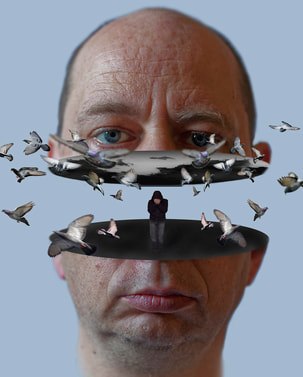
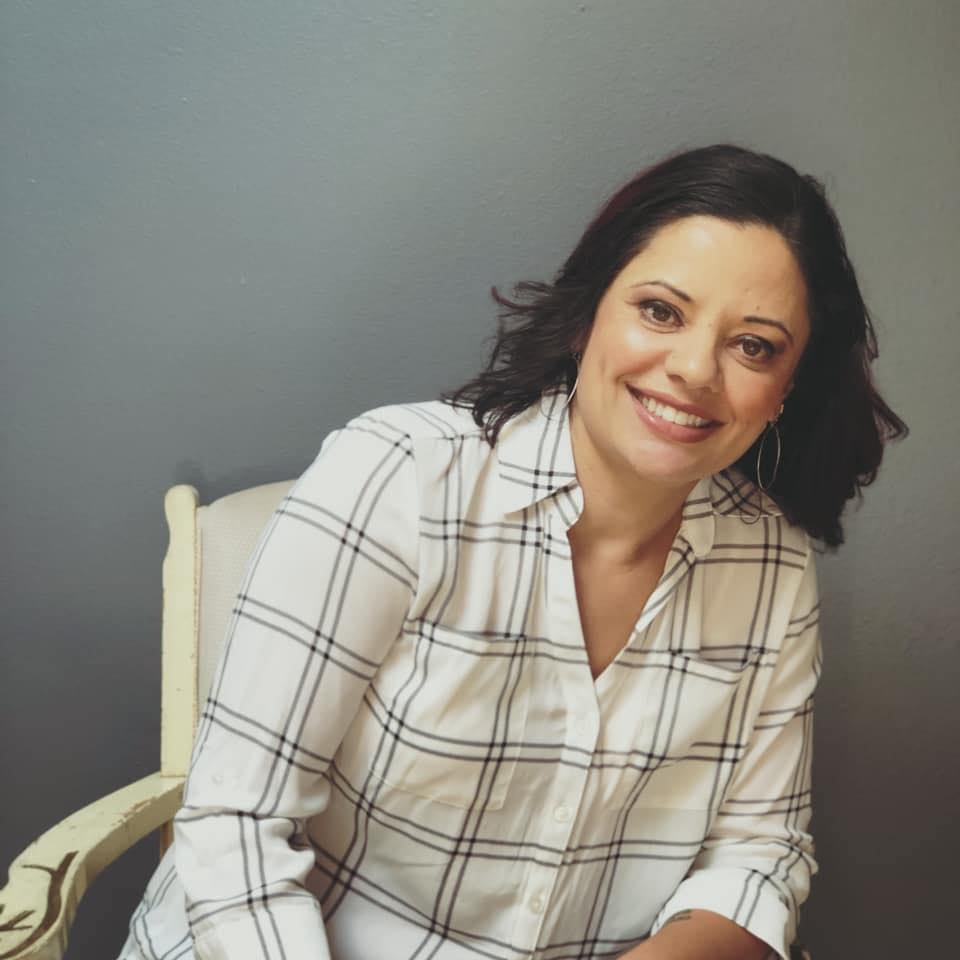
 RSS Feed
RSS Feed